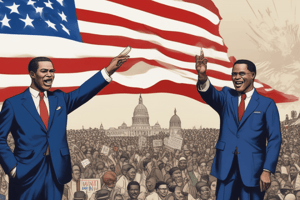Podcast
Questions and Answers
What was the primary goal of the Civil Rights Movement in the United States?
What was the primary goal of the Civil Rights Movement in the United States?
- To end racial segregation and discrimination against African Americans (correct)
- To establish racial supremacy for African Americans
- To promote social inequality among different races
- To advocate for racial segregation laws
Which principles were central to the Civil Rights Movement?
Which principles were central to the Civil Rights Movement?
- Supremacy, domination, and aggression
- Equality, justice, and non-violent resistance (correct)
- Inequality, injustice, and violent resistance
- Segregation, discrimination, and passivity
How did the Civil Rights Movement impact society globally?
How did the Civil Rights Movement impact society globally?
- It advocated for violence as a means of social change
- It promoted racial discrimination in other countries
- It enforced segregation in various regions
- It inspired movements for equality and justice worldwide (correct)
What type of political system is India according to the text?
What type of political system is India according to the text?
What distinguishes different political systems from each other?
What distinguishes different political systems from each other?
Which of the following characteristics does NOT apply to the Civil Rights Movement?
Which of the following characteristics does NOT apply to the Civil Rights Movement?
What is the main focus of the Civil Rights Movement?
What is the main focus of the Civil Rights Movement?
Why are checks and balances important in a democratic system?
Why are checks and balances important in a democratic system?
How does non-violent resistance contribute to achieving political and social change?
How does non-violent resistance contribute to achieving political and social change?
In what way does federalism play a role in a multi-cultural society like India?
In what way does federalism play a role in a multi-cultural society like India?
What is the significance of political participation in a democratic society?
What is the significance of political participation in a democratic society?
How does the Constitution protect the rights and freedoms of citizens in the United States and India?
How does the Constitution protect the rights and freedoms of citizens in the United States and India?
Flashcards are hidden until you start studying
Study Notes
Civil Rights Movement and Political Systems in India's Class 10 ICSE Civics
The Civil Rights Movement and our political systems, as integral parts of civics, are topics that help us understand the evolution of human rights and the mechanisms through which societies are governed. In the context of the Indian Certificate of Secondary Education (ICSE) Class 10 syllabus for 2024, we'll explore these concepts and the questions they raise.
Civil Rights Movement
The Civil Rights Movement, which occurred in the United States from the mid-1950s to the 1960s, sought to end racial segregation and discrimination against African Americans. It was a pivotal moment in modern history, with its principles of equality, justice, and non-violent resistance resonating globally. The movement showcased the indomitable spirit of ordinary citizens working together to secure their rights and freedoms.
Political Systems
Political systems are the frameworks that govern societies—from democracies to monarchies, communism to federalism. Each system has its own approach to distributing power, addressing grievances, and ensuring the welfare of citizens. India, for example, is a federal parliamentary democratic republic, characterized by a separation of powers and a multi-party system.
Class 10 ICSE Important Questions
-
Explain the key features of the Civil Rights Movement in the United States and its impact on society.
-
Discuss the main principles of democracy and their importance in a democratic government.
-
Analyze the differences and similarities between the political systems of India and the United States.
-
Examine the role of civil rights in promoting equality and justice, with reference to the Civil Rights Movement and other historical movements.
-
Discuss the significance of non-violent resistance in achieving political and social change, with examples from the Civil Rights Movement and other historical movements.
-
Explain the concept of federalism and its relevance in a multi-cultural society such as India.
-
Discuss the importance of checks and balances in a democratic system, with reference to the separation of powers in India.
-
Analyze the significance of political participation and civic engagement in a democratic society.
-
Discuss the role of the Constitution in protecting the rights and freedoms of citizens, with reference to the United States and India.
-
Examine the challenges faced by democratic systems, such as corruption, inequality, and minority rights, and suggest measures to address these challenges.
Conclusion
Understanding the Civil Rights Movement and political systems is essential to comprehend our capacities as citizens, as well as our responsibilities to participate in the democratic process. As we navigate the complexities of the modern world, these concepts will remain indispensable in addressing the challenges we face, from safeguarding rights and freedoms to fostering cooperation and understanding among diverse communities.
Studying That Suits You
Use AI to generate personalized quizzes and flashcards to suit your learning preferences.




